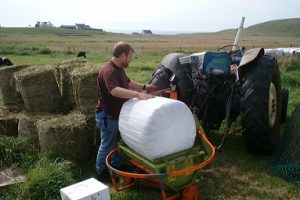 When it comes to choosing the right bale wrap, there are three factors that you should consider, whether it be sisal, twine, plastic, net wrap, or tube wrap. These three factors are essential in choosing a Unipak bale wrap as it provides you with the necessary information to make the best decisions. Without any further ado, here are the three factors that we’re talking about:
When it comes to choosing the right bale wrap, there are three factors that you should consider, whether it be sisal, twine, plastic, net wrap, or tube wrap. These three factors are essential in choosing a Unipak bale wrap as it provides you with the necessary information to make the best decisions. Without any further ado, here are the three factors that we’re talking about:
Productivity in the Field
Twine is many times slower in the field to wrap bales with that the newer and more advanced net wrap. Baling using a net wrap can increase overall productivity by up to 30 to 35 per cent depending on bale size and number or wraps. Most farmers and balers can add several net wrap features for $3,000 – $4,000, costing about $1 per bale, which is more than twine depending on how much is used on the baling process. Generally, one-and-a-half to two wraps using the net wrap is already sufficient to wrap an entire batch.
Losses that Occur During Storage
According to research, the average dry matter loss for sisal twine was around 20 per cent, 11 per cent for plastic twine, and 7 per cent for net wrap. Sisal twine tends to rot at the bottom of the bale even before the end of the storage period. Some bales will also tend to sag, which enables more water penetration. Plastic twine holds bales together, which helps in the shedding of water. Net wrap is the most effective of them all. However, the bales must be placed on a well-drained surface, so water doesn’t pour straight to the bottom of the bales.
Tube-wrapping is another option. Baling at 30-35percent moisture versus the traditional 18-20 per cent tube-wrapping saves you a day in the field. It works very well for farmers and producers in areas with humid and rainy climates. Using tube-wrapping will yield only a three to seven per cent dry matter loss.
Feeding Bales
Even if you’re leaning towards getting off your tractor whenever you feed and cut your Unipak bale wrap, it can still be problematic to remove, especially net wraps that have accumulated a lot of ice and snow. Once you’ve successfully removed your wrap, keep in mind that there are some, namely net wrap and plastic twine, that end up wrapped around equipment such as manure spreader beaters and mower shafts.
Always keep these things in mind when choosing a Unipak bale wrap. That way, you can make the best decision and choose the one that’s ideal for your needs.



